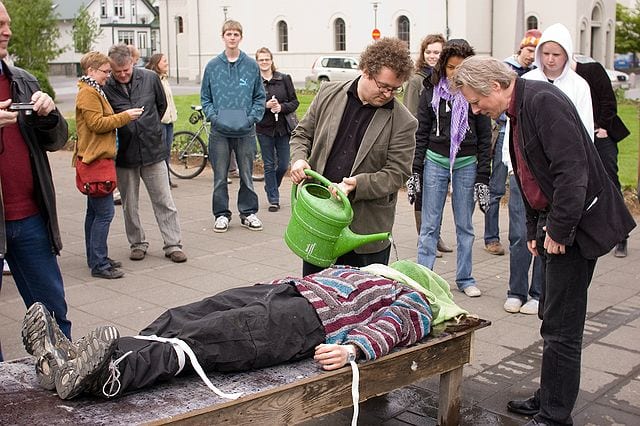
I wrote a lengthy explanation which was wiped out by hitting a wrong key. I was 95% done with the re-write and then IT was wiped out. This almost never happens to me. Okay, I guess God doesn’t want the lengthy version. So now I will do a “nutshell” one.
I changed as a result of interacting with my friend Patti Sheffield, who manages to engage in wonderful dialogue without either 1) questioning the integrity and orthodoxy of Catholics who disagree on this issue, or 2) insulting others who disagree, and acting like a condescending jerk.
The second influence in recent days was reading an excellent historical article on the issue of torture and corporal punishment, published by my friend Phillip Campbell on the Unam Sanctam Catholicam website. That, too, made its case without recourse to childish insult.
Two other things happened. Mark Shea recommended a book called How to Break a Terrorist (2011), by Matthew Alexander, an interrogator, who successfully used a non-physical method. I thought that this was interesting. If it works, it works, and physical methods need not necessarily be used.
Another insight came from Kevin Tierney, the guy who has a love-hate relationship to apologetics and has blasted me off and on for a dozen years or so. He noted different levels of physical coercion: legitimate spanking, abuse, and torture.
This got me to thinking that waterboarding may be in a category where it is neither justified, nor torture, but rather, an in-between status of “abuse.” I came to conclude that it is an abuse that should never be done, while not being torture and intrinsically evil.
This cleared up many difficulties I was struggling with, because to me it was self-evident that practices such as cutting off fingers, drilling holes in skulls, or throwing acid in someone’s face were clearly torture in a way that waterboarding doesn’t remotely approach.
Contrary to the lies that have been spread about me for many weeks, I have never been an advocate of waterboarding. I was agnostic and working through the issue. But people who have an agenda simply assume that a person who is seeking must somehow be lying about it and playing some sort of deceitful game.
It doesn’t follow that I “desired” it or admired it or anything of the sort. All of that rotgut was projected onto me, but not a word of it is true. Nor have I ever advocated “torture” at any time, and have agreed all along that it is intrinsically evil. Yet a bunch of dim-witted slanderers routinely called me a “torture apologist” or “pro-torture.” I can’t express in words how much utter contempt I have for such things. It’s an absolute disgrace.
So now I am in a place where I continue to agree with many of my friends that it isn’t torture, while I agree with other numerous friends (i.e., those who actually hang around and don’t compare me to Nazis and Holocaust deniers) insofar as I think it should never be done, but disagree with them that it is torture. Perhaps this will make the lying stop. More likely, I’ll be characterized as wishy-washy or some such. The hostility and wickedness of slander and calumny doesn’t go away in one day. It is irrational and diabolical in origin, so it won’t diminish on either rational or Christian grounds.
But I changed my mind, and I don’t give a fig who likes that or doesn’t, or who insults me as a result. Nor do I care about any praise that might come as a result of this. I seek truth. I don’t follow logical fallacies. The genetic fallacy states that something is believed to be true merely because someone popular or likable asserts it, or because the trendy crowd does. Likewise, if we reject something as untrue, simply because someone who has been acting derisively and foolishly states it, that is a fallacy, too.
Hence, I was influenced in my change of mind by two people who conducted themselves honorably and two who were dishonorable and wantonly insulting in their conduct. It matters not to me what the source of an insight is, as long as it is true. As they say, even an unplugged clock is right twice a day.
I thought about the thing and changed my mind. I’m still somewhat in-between, because I have elements of the beliefs of both sides of a very polarized issue. That’s perfectly irrelevant to me. If it makes me more popular, I am. I don’t seek fame and approval. If it makes me more despised, then I am. That doesn’t sway one bit or iota what I do or think, either. I’m not a man-pleaser. I often displease men quite a bit! I seek always (by His grace) to be a God-pleaser.
*
[further random thoughts originally in the Facebook combox]:
It’s sort of like the faith and works issue between Catholics and Protestants. There are fundamental definitional issues. Yet we actually agree in practice.
Both sides believe that we are saved by grace and that good works ought to be done as the necessary evidence that we have a real faith.
That’s how this is. I say waterboarding ain’t torture, someone else says it is. I agree with them, though, that it shouldn’t be done, so there is practical agreement, alongside abstract disagreement (on definition and classification).
I think other methods can be used. I haven’t figured out what they might be, or the exact parameters, but I have come to believe that waterboarding is sufficiently abusive so that it shouldn’t be done.
My critics look completely foolish now in their attacks against me. They always did, of course, because it was based on the lies that I was “pro-torture” and a “torture apologist” but now they look even more ridiculous, because how could I have been advocating waterboarding all along (and even supposedly last night and this morning), when I was agnostic before and now say it shouldn’t be done at all?
I was not advocating anything. Now that I have come out against it, even now it isn’t according to what the more extreme “cops” will say. If they wanna quibble with me about definition, let them. They’ll only look more absurd and asinine than they already do. Demagogues don’t grasp the process of actual thinking.
As predicted, my view now got called “a lame middle of the road stance” and “This is what I would expect a politician to be saying.”
Morality isn’t determined by what evil people do, but by its own nature. This is the same approach that caused us to drop the bombs in Japan and incinerate 100,000 civilians: “those wicked, filthy Japanese! They were mean to us so we’ll partake in their evil and be even more mean to them and wipe them out!” I vigorously defended the Church’s teaching against deliberately murdering civilians in 2005 and lost a friend over that, too.
All we can do is search out a person to dialogue with who is secure in their own skin, knows how to think and use brain cells, and able to discuss substantive issues minus insult: someone like Patti Sheffield or Diane Korzeniewski. It’s not a coincidence that they are both women. Women do far better than men in this area, and virtually all of the people who have been the biggest offenders against charity, and the purveyors of verbal diarrhea regarding this whole issue have been men.
Women, by and large, “get” the many biblical (and non-optional) commands to control the tongue, approach others with charity, esteem them higher than ourselves, refraining from bearing false witness, believing the best, not the worst of others (1 Corinthians 13), and refraining from judging the hidden motivations of others.
Men are much more combative and prideful and stubborn by nature, it seems to me. Women have plenty of other faults, but they beat us by a long ways in this particular matter.
We all have to determine what is right and wrong in good conscience, with our consciences duly informed by a thorough understanding of Catholic and biblical teaching.
Lots of folks believe the right things for the wrong reasons and the wrong things for seemingly “right” reasons. Obviously, we should believe the right things for the right reasons.
I don’t mind “thinking out loud.” I am a public figure, after all, and an apologist. And I love the whole thinking process (if only it wasn’t impeded by loudmouthed revilers).
But the rank lies and slanders that were thrown out (which also occurred during the time my mother was dying and did die: and my opponents were aware of this) have hurt my reputation among some. I’m not worried about it. People will believe what they will. It happens all the time in apologetics. But there definitely was damage done, with many hundreds if not thousands reading sewer scum bilge and slanders.
This is a serious sin, and people do need to think seriously about it, repent, and make it right. It doesn’t harm me in the long run, but it greatly harms those who did it, unless they repent of it.
*
See also the lengthy group discussion in the original Facebook combox.
On 12-4-17, a little under three years later, I also announced that I was totally opposed to capital punishment (having previously favored it for some years only for terrorists and mass murderers).
Some folks claim I never change my mind. Really? Not to mention that I used to be a pagan who didn’t go to church for ten years, a Protestant evangelical, pro-choice, an extreme social / sexual liberal, and in favor of radical feminism. I became a distributist in October 2013 as well (although I probably had been one for years and just didn’t know it). Lots of big changes there!
***
(originally written on 1-31-15 on Facebook)
Photo credit: Karl Gunnarsson: of a protest against waterboarding in Ireland, 5-30-08 [Wikimedia Commons / Creative Commons Attribution-Share Alike 2.0 Generic license]
***













